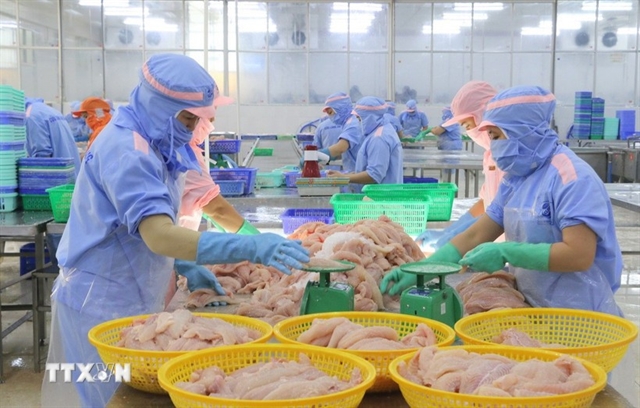 Life & Style
Life & Style

Sodas and other sweetened beverages provide a lot of added sugar that your body does not need. Let’s think about your morning routine. Do you start your day with some coffee or tea with sugar? And do you then drink sodas, sweet tea, or energy drinks all day? This is the first place you can cut back. Giving up these drinks can be hard, but here are some helpful tips.
 |
| Dietitian Jill Tuong Truong. — Photo courtesy of Family Medical Practice Vietnam |
By Jill Tuong Truong *
Say goodbye to your sugary drinks
Sodas and other sweetened beverages provide a lot of added sugar that your body does not need. Let’s think about your morning routine. Do you start your day with some coffee or tea with sugar? And do you then drink sodas, sweet tea, or energy drinks all day? This is the first place you can cut back. Giving up these drinks can be hard, but here are some helpful tips.
Try to cut the amount of sugar in coffee or tea by half each week, until you are down to one teaspoon.
Substitute the sugary sodas for no-calorie sparkling water, then squeeze in a wedge of lime, lemon, or orange to add flavour. Feel free to add some mint leaves, lemongrass or other herbs you like.
Trans fat – What is it and why should you avoid it?
Artificial trans fat (or trans fatty acid) are created in an industrial process that adds hydrogen to liquid vegetable oils to make them more solid. Trans fats are used commonly in industrial food, especially frying and baking goods. They are easy to use, inexpensive to produce and last a long time. Hence, they extend the shelf life of food products and moreover, they enhance flavours and impact texture. Trans fats are typically found in margarine, fried food, potato chips, cakes, cookies, crackers, and pies.
Why worry? Because trans fats raise blood cholesterol levels, particularly the "bad" LDL cholesterol and another type of blood fat, called triglycerides. Also, they can reduce the "good" HDL cholesterol. Trans fats increase the risk of heart disease, diabetes and cancer.
As part of a healthy diet, you need to pay attention to the trans fat amounts listed on nutrition labels (usually on the back or on the side of the package) and aim to keep them to a minimum.
Beer can cause overweight and a beer belly!
Drinking beer can lead to weight gain. It is not necessarily beer but any kind of calorie food/drink - such as sugary drinks, alcohol, fast food - can contribute to belly fat. In general, alcohol is linked to bigger waistlines due to the fact that your liver burns alcohol instead of fat. Let’s do the math. One bottle of beer (330 ml) has about 150 calories. If you drank two bottles a day for 12 days, you would gain 0.5 kg. If you don’t exercise, how would you burn off the extra weight and also the fat in the abdominal area?
Drinking less alcohol is a good place to start; you should pick up light beers with less calories and also limit the amount of beer per day. If you want to watch a soccer match at a sport bar or go to the stadium during weekends, fill your stomach with healthy food first to help you stay away from unhealthy high- calorie game-day foods. Last but not least, keep in mind that any kind of exercise will help to keep the weight off and don’t forget to increase the intensity.
If a diet is too good to be true, it probably is a fad diet.
Have you heard diets or products promising weight loss of 5 kg a week? Does it sound good? Yes, but it is too good to be true. There is no magic pill that can help you burn fat without moving, and there is no magic diet that results in dramatic weight loss in a short time and can be considered healthy. If you lose too quickly, you are more likely to regain it quickly.
Avoid any diet that eliminates any food group completely from your life. The most popular food group that usually gets restricted is carbohydrates. A balanced meal is a combination of all food groups that can provide critical nutrients to your body. Also, avoid any diet that includes just certain foods. Your body needs a variety of foods.
Food to avoid when you are sick
Fried & spicy food: the strong smell and the flavor of fried or spicy food may make you crave for those when you are sick. However, they are hard to digest and interfere with your body’s ability to fight off the illness. Stick to simple, easy to digest food, such as chicken soup.
Sweet treats, such as cookies, candy, and ice-cream comfort you, but sweet treats contain immune-suppressing sugar. Instead, have some fruits and vegetables that are packed with vitamins and can help you recover faster.
Alcohol and sugary drinks: Alcohol dehydrates you. That means your body has to work even harder to help you recover. Also, sugary drinks can exacerbate inflammation. Drink a lot of water or try some herbal tea.
Fish and pregnancy
Many types of fish provide important health benefits for you and your baby. Most fish are safe to eat during pregnancy. They are a great source of high quality protein, and rich in omega 3 essential fatty acid. If you take omega 3 supplements, you still miss out on high-quality protein and other vitamins and minerals.
Nowadays, along with the growth of industry and mass production, more mercury is released into the environment. Fish absorb mercury and some have higher mercury levels than others, especially fish that eat other fish, and also those that live longer.
Here are the best fish choices from the US Food and Drug Administration (FDA) and Environmental Protection Agency (EPA): anchovy, catfish, clam, crab, cod, herring, flounder, lobster, salmon, sardine, scallop, shrimp, squid, tilapia, and tuna (canned). Fish to avoid: shark, swordfish, tuna (bigeye), and marlin. Last but not least, remove skin, fat and internal organs before you cook these marine creatures.
No soda for kids, please
Sodas can be addictive and it is very important to stop the habit before it begins. According to the American Heart Association, children (2-18 years old) should not consume more than 250 ml of sugary drink per week. This includes sweet tea, artificial fruit drinks, energy drinks and sodas. Children under 2 should not be given any sugary drinks. Introducing sugary drinks and sweet treats as late as possible can help your child develop a life-long preference for healthier foods.
For example, 240 ml of lowfat milk has about 100 calories and 12 grams of sugar, while the same quantity of soda has 100 calories and 27 grams of sugar. Your child does not need the extra sugar, which can cause tooth decay. Did you know that sodas can also deplete bones of much needed calcium? Phosphorus in soda leads to bone loss, and caffeine is also known to interfere with the absorption of calcium and bone density. Children who drink sodas frequently are also more likely to consume less than the daily recommended amount of milk, and are more likely get less than the recommended amount of calcium, magnesium and vitamin A.
All children need are healthy, balanced meals with a variety of food groups, milk and water.— Family Medical Practice Vietnam
*Jill Tuong Truong is a registered dietitian at Family Medical Practice Ho Chi Minh City. She recently returned to Việt Nam from years of study in New York and Oklahoma, the United States. Jill sees patients with a range of nutritional needs—whether they be ill and seeking treatment, or otherwise healthy and wanting a change in their personal eating habits.
For more advice on any medical topics, visit Family Medical Practice Hanoi on 298 I Kim Mã, Ba Đình. Tel: (04) 3843 0748. E: hanoi@vietnammedicalpractice.com.
FMP’s downtown HCM City is at Diamond Plaza, 34 Lê Duẩn, District 1; 95 Thảo Điền Street, District 2. Tel: (08) 38227848. E: hcmc@vietnammedicalpractice.com
FMP Danang is located at 96-98 Nguyễn Văn Linh Street, Hải Châu District, Đà Nẵng. Tel: (0236) 3582 699. E: danang@vietnammedicalpractice.com.




